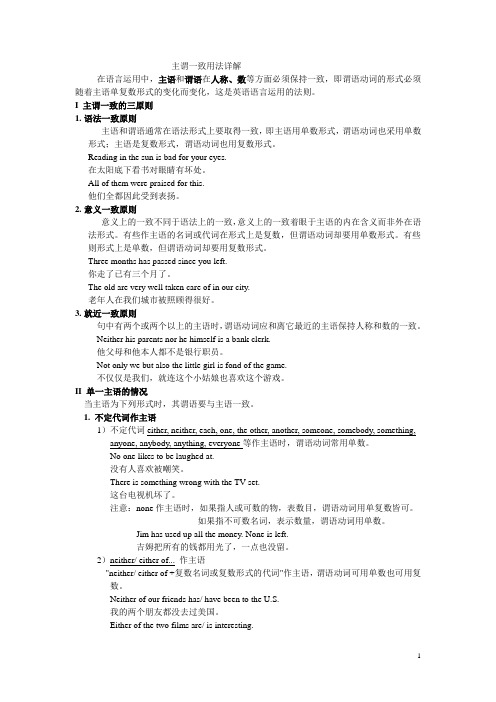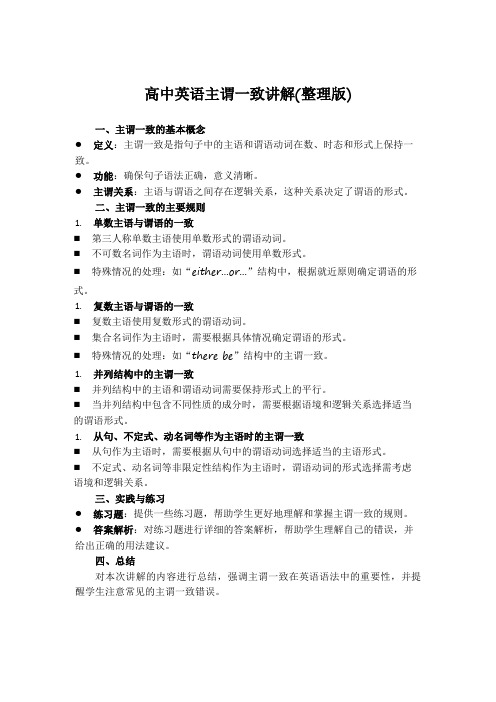第十四章主谓一致和虚拟语气
虚拟语气主谓一致

Six times two are twelve. are 改为 is 十二、某些结构后所跟谓语动词必须用单数。 加 plus, added, and 减 minus 乘 time, multiply 除 divided (…by) Six divided by three is two.
are One or two books ______ needed.
is/are One book or two ______ needed.
九、"one or two+名词复数","one or more+ 名词复数"作主语,谓语动词用复数。 "one/a+单数名词or two"作主语,谓语动 词可用单数也可用复数。
六、就近原则
主语由连词or, either...or, neither...nor, not only...but(also), nor, whether…or, not…but…, there be等连接的两个名词或代词组成时,其谓 语动词应与最近的名词一致。 倒装句中,也遵从就近原则
七、由and连接的名词的主谓一致情况分以下几种: 1.当and连接的两个名词指同一人、同一事或同一概念时,谓语 动词用单数。例如: The teacher and writer is respected by all the people around. 2.当and连接两个都有冠词的名词作主语时,谓语动词用复数。 The teacher and the writer are greatly respected here. 3.形容词+and+形容词+名词作主语时,谓语动词用复数。 Social and political freedom are limited there. 4.用and连接的单数名词,前面有each, every, many a, no修饰 语时,谓语要用单数。 Every man, woman, and child takes part in the activity. Each pen and each paper is found in its place.
高中英语主谓一致用法详解文档

主谓一致用法详解在语言运用中,主语和谓语在人称、数等方面必须保持一致,即谓语动词的形式必须随着主语单复数形式的变化而变化,这是英语语言运用的法则。
I 主谓一致的三原则1.语法一致原则主语和谓语通常在语法形式上要取得一致,即主语用单数形式,谓语动词也采用单数形式;主语是复数形式,谓语动词也用复数形式。
Reading in the sun is bad for your eyes.在太阳底下看书对眼睛有坏处。
All of them were praised for this.他们全都因此受到表扬。
2.意义一致原则意义上的一致不同于语法上的一致,意义上的一致着眼于主语的内在含义而非外在语法形式。
有些作主语的名词或代词在形式上是复数,但谓语动词却要用单数形式。
有些则形式上是单数,但谓语动词却要用复数形式。
Three months has passed since you left.你走了已有三个月了。
The old are very well taken care of in our city.老年人在我们城市被照顾得很好。
3.就近一致原则句中有两个或两个以上的主语时,谓语动词应和离它最近的主语保持人称和数的一致。
Neither his parents nor he himself is a bank clerk.他父母和他本人都不是银行职员。
Not only we but also the little girl is fond of the game.不仅仅是我们,就连这个小姑娘也喜欢这个游戏。
II 单一主语的情况当主语为下列形式时,其谓语要与主语一致。
1. 不定代词作主语1)不定代词either, neither, each, one, the other, another, someone, somebody, something, anyone, anybody, anything, everyone等作主语时,谓语动词常用单数。
虚拟语气的常见用法总结

虚拟语气的常见用法总结虚拟语气是一种特殊的语气形式,用来表示说话者对某种情况是假设、愿望、建议或推测等的态度。
在英语中,虚拟语气的用法相对复杂,但是掌握了常见的用法,就能够在表达自己的意思时更加准确和自如。
一、虚拟语气的定义和用法虚拟语气用于表达说话者的假设、愿望、建议、命令、要求、要求、要求等意愿情态。
在语法上表现为动词形态的变化和句子结构的变化。
以下是虚拟语气的常见用法。
1. 假设虚拟语气常用于表达假设,即假设一种不存在的情况。
例句:If I were a bird, I would fly freely in the sky.意思:如果我是一只鸟,我会自由自在地在天空中飞翔。
2. 愿望虚拟语气也可用于表达愿望,即希望实现一种未来的情况。
例句:I wish I had a car.意思:我希望我有一辆车。
3. 建议虚拟语气还可用于表达建议或推荐的动词后面。
例句:I suggest that he go to the doctor.意思:我建议他去看医生。
4. 命令或要求虚拟语气也可用于表示命令、要求或愿望等。
例句:She demanded that he leave immediately.意思:她要求他立即离开。
二、虚拟语气的形态变化在虚拟语气中,动词的形态会发生变化。
以下是常见的虚拟语气形态变化:1. 过去式(对于现在情况的虚拟)例句:If I had more time, I would travel around the world.意思:如果我有更多时间,我会周游世界。
2. 过去完成式(对于过去情况的虚拟)例句:If I had studied harder, I would have passed the exam.意思:如果我学得更努力,我就能通过考试了。
3. should + 动词原形(用于建议、命令或要求等)例句:I suggest that he should go to the dentist.意思:我建议他去看牙医。
主谓一致与虚拟语气

3. 就近原则 与就远原则
1.就近原则 There be, either…or…, neither…nor…, not only…but also…, nor…or... Eg. Neither the students nor the teacher is to attend the meeting. Eg . There is an apple, two bottles and three books on the desk.
注意 有些集体名词如police, people, militia, cattle, youth 等作主语时谓语动词通常用复 数。 Eg . The police are discussing in the meeting room. Eg . Are there any cattle in the farm?
3) One of +n (复数)谓复 the only one of + n (复数) 谓单 Eg. This is one of the best movies that have been on this year. Eg. She is the only one of the students who is good at French in our class.
4) 并列结构作主语时谓语动词的数 并列结构作主语时谓语用复数 ,用and 或 both and连接并列主语,谓复 Eg. Tom and Jim are good friends. 注意:当主语由and连结时,如果它表示一个 单一的概念,即指同一人或同一物时,谓 语动词用单数,and 此时连接的两个词前只 有一个冠词 Eg. The poet and writer is famous.
2024年新高考版英语主谓一致、虚拟语气、省略、倒装、强调讲解部分

“a number of+复数名词”作主 A number of other plants were
语时,谓语动词用复数形式,意为 found in America.在美洲还发现
“许多……”;“the number of+ 了许多其他的植物。
复数名词”作主语时,谓语动词 The number of people who travel
复合不定代词someone、anyone、everyone、nobody/no one、something、anything、everything、nothing等作主语时,谓语动词用单数
If anyone sees Lisa, ask her to call me.如果有人看 到莉萨,请她给我打个电话。 Nothing is impossible to a willing heart.世上无难 事,只怕有心人。
If he shouldn't come tomorrow, we would put off the meeting.如果他 明天不来,我们就推迟 这个会议。
使用“(should+)动词原形”的虚拟语气 1.用于宾语从句 以下动词后的宾语从句常常使用虚拟语气,即谓语为“(should+)动词原 形”。
原则
意义 一致
课标必备点梳理
常见用法
例句
当“几分之几/百分之几/half/ the rest/most+of+名词”结构作 主语时,一般根据of后的名词的 单复数决定谓语动词的单复数
20% of the people in the city object to the price of running water going up. 这个城市中百分之二十的人反 对自来水价格上调。
高中英语主谓一致讲解(整理版)

高中英语主谓一致讲解(整理版)
一、主谓一致的基本概念
●定义:主谓一致是指句子中的主语和谓语动词在数、时态和形式上保持一致。
●功能:确保句子语法正确,意义清晰。
●主谓关系:主语与谓语之间存在逻辑关系,这种关系决定了谓语的形式。
二、主谓一致的主要规则
1.单数主语与谓语的一致
⏹第三人称单数主语使用单数形式的谓语动词。
⏹不可数名词作为主语时,谓语动词使用单数形式。
⏹特殊情况的处理:如“either...or...”结构中,根据就近原则确定谓语的形式。
1.复数主语与谓语的一致
⏹复数主语使用复数形式的谓语动词。
⏹集合名词作为主语时,需要根据具体情况确定谓语的形式。
⏹特殊情况的处理:如“there be”结构中的主谓一致。
1.并列结构中的主谓一致
⏹并列结构中的主语和谓语动词需要保持形式上的平行。
⏹当并列结构中包含不同性质的成分时,需要根据语境和逻辑关系选择适当的谓语形式。
1.从句、不定式、动名词等作为主语时的主谓一致
⏹从句作为主语时,需要根据从句中的谓语动词选择适当的主语形式。
⏹不定式、动名词等非限定性结构作为主语时,谓语动词的形式选择需考虑语境和逻辑关系。
三、实践与练习
●练习题:提供一些练习题,帮助学生更好地理解和掌握主谓一致的规则。
●答案解析:对练习题进行详细的答案解析,帮助学生理解自己的错误,并给出正确的用法建议。
四、总结
对本次讲解的内容进行总结,强调主谓一致在英语语法中的重要性,并提醒学生注意常见的主谓一致错误。
动词时态语态虚拟语气主谓一致

(5)come,go,leave,start,arrive,fly等动词后, (5)come,go,leave,start,arrive,fly等动词后, come,go,leave,start,arrive,fly等动词后 用现在进行时表示将来。 用现在进行时表示将来。 sure后接 (6)在短语make (6)在短语make sure, see (to) it, be sure后接 在短语 从句,用一般现在时表将来。 从句,用一般现在时表将来。 eg.My mother ___(leave) for Beijing tomorrow. eg.Make sure all the windows ___(close) before you leave. eg.See to it that the door ___(fasten) before you go to bed.
现在/ 3. 现在/过去完成时的用法 (1)在 (1)在“It/This is the best/worst/most interesting+名词 that…”中 名词+ interesting+名词+that…”中,从句用现 在完成时。 在完成时。 (2)在 that…”中 (2)在“It/This is the first/last time that…”中, 从句用现在完成时。 从句用现在完成时。 (3)在 (3)在“It was the first time that sb. had done” 主句一般过去时,that引导的从句 中,主句一般过去时,that引导的从句 用过去完成时。 用过去完成时。 (4)hope,wish,expect,think,intend,mean=intend, (4)hope,wish,expect,think,intend,mean=intend, suppose等的过去完成时的含义指 等的过去完成时的含义指“ suppose等的过去完成时的含义指“过 去没有实现的愿望、计划” 去没有实现的愿望、计划”。含失望 的感情色彩。 的感情色彩。
虚拟语气和主谓一致

主谓一致⏹“一致”(concord或agreement)指句子成分之间或词语之间在语法形式上的协调关系。
主谓一致指主语和谓语动词之间在“人称”和“数”的方面的一致关系,这又叫做“主-动一致”(Subject-verb Concord )。
指导原则⏹1.语法一致原则(Grammatical Concord)⏹主语为单数形式,谓语动词用单数形式;主语为复数形式,谓语动词也用复数形式。
⏹The number of errors was surprising.⏹Jane and Mary look alike.⏹2. 意义一致原则(Notional Concord)⏹1)主语形式虽为单数,但意义为复数,谓语动词为复数。
⏹The crowd were running for their lives.⏹单数形式代表复数内容的词有:people, police, cattle, militia等。
⏹2) 主语形式为复数,而意义上却是单数,谓语动词用单数。
⏹The news was very exciting.⏹形复意单的单词有news, works (工厂)和一些以ics结尾的学科名称,physics, economics等。
⏹3. 就近原则(Principle of Proximity)⏹谓语动词的单复数形式取决于最靠近它的词语。
如用连词or,either…or, neither…nor, not only…, but also等连接的并列主语,如果一个是单数,一个是复数,谓语动词与靠近它的主语一致。
⏹Either your students or Mr. Wang knows this.I. 以S结尾的名词作主语的主谓一致⏹1.以S结尾的表示疾病的名词作主语时谓语用单数⏹arthritis:关节炎bronchitis :支气管炎⏹mumps:腮腺炎diabetes:糖尿病⏹phlebitis:静脉炎⏹但是measles(麻疹),rickets(软骨病) 谓语可用单/复数⏹2.以S结尾的表示游戏名称的名词谓语常用单数⏹darts:投镖游戏dominoes:多米诺骨牌⏹marbles:打弹子游戏billiards:台球⏹但cards(打纸牌)用复数;⏹当它们表示所用工具时谓语用复数⏹Darts is often played in English pubs.⏹Two darts are thrown at every turn.⏹3.以ics结尾的学科名称通常用单数⏹mathematics:数学physics:物理学⏹optics:光学 statistics:统计学⏹politics:政治学acoustics:声学/音响效果⏹economics:经济学athletics:体育学⏹mechanics:机械学semantics:语义学⏹linguistics:语言学tactics:兵法/策略⏹当这类名词表示学科以外的其它意义时用作复数⏹Statistics is not as difficult as some people think.⏹The latest statistics on crime are beyond description.⏹注:下列以ics结尾的名词仅用作单数⏹classics:杰作,著作comics:连环图画⏹ethics: 伦理学cosmetics:化妆品⏹4.以S 结尾的地理名称如山脉,海峡,瀑布,群岛等谓语动词通常用作复数⏹the West Indies西印度群岛⏹the Bahamas巴哈马群岛⏹the Himalayas喜马拉雅山脉⏹the Straits of Gibraltar直布罗陀海峡⏹the Niagara Falls 尼亚加拉瀑布⏹the Rockies 落基山脉⏹但如果是国名,则用作单数,如:the United States, the UnitedNations, the Netherlands(荷兰)。
- 1、下载文档前请自行甄别文档内容的完整性,平台不提供额外的编辑、内容补充、找答案等附加服务。
- 2、"仅部分预览"的文档,不可在线预览部分如存在完整性等问题,可反馈申请退款(可完整预览的文档不适用该条件!)。
- 3、如文档侵犯您的权益,请联系客服反馈,我们会尽快为您处理(人工客服工作时间:9:00-18:30)。
第14章主谓一致和虚拟语气一、主谓一致(一)并列主语时的主谓一致(1)主语中包含有and时①、两个单数名词用and 连接,表示两个不同的概念时,谓语动词用复数。
如:Tom and Jack were close friends.汤姆和杰克是亲密是朋友。
Steam and ice are different forms of water.蒸汽和冰是水的不同形式。
②、两个单数名词用and 连接,表示同一人且两个名词共用一个冠词,同一物或同一概念,或表示不可分的整体时,谓语动词仍用单数。
如:Trial and error is the source of our knowledge.不断尝试是我们获得知识的源泉。
The singer and dancer is to attend our evening party.那位歌舞演员将参加我们的晚会。
用and 连接的两个名词表示组合在一起的一个整体或成套的东西,若需要冠词,则只能在第一个名词前加a/an/the;作主语时,谓语动词用单数。
但若两个名词都有冠词或限定词,则指独立的两样东西;作主语时,谓语动词用复数形式。
常作为一个整体概念来对待的组合有:bread and butter 黄油面包bread and cheese 涂奶酪的面包a knife and fork 一副刀叉a watch and chain 一只系有表带的手表③、被every, each, many a ,no等限定的单个主语由and 连接时,谓语动词仍用单数。
其中后一个限定词可省略。
如:Each boy and (each) girl has an apple.每个男孩和女孩都有一个苹果。
Many a teacher and (many a) student has seen the film.许多老师和学生看过这部电影。
④、一个单数名词被几个用and连接的并列形容词所修饰时,可以指一件事或几件事,这种名词作主语,要根据意义一致的原则决定谓语动词的数。
如:Simple and plain living is a fine quality.生活简朴是一种优良品质。
English and American literature are appealing to her.英国文学和美国文学都对她有吸引力。
⑤、由and 连接的两个what 从句作主语时,要根据意义一致的原则决定谓语动词的数。
如:What he says and does do not agree.他言行不一致。
What he says and does not concern me.他的言行与我无关。
(2)由or, nor, either…Or, neither…nor, not only…but (also) 连接的并列主语,通常根据就近原则,谓语动词的单复数要跟与它邻近的主语的数一致。
如:One or two friends are coming this evening.今天晚上有一两个朋友要来。
A cigar or a cigarette is very enjoyable.来一支雪茄或者香烟挺带劲的。
Neither I nor he is in favour of her marriage.我和他都不赞成她的婚姻。
Either you or I am going to be in charge of this matter.不是你就是我将负责这件事。
(3)单数名词+with, along with, together with, as well as, rather than, as much as, but, except 等所跟的名词作主语时,谓语仍用单数形式。
如:Tom as well as two of his friends was invited to the party.汤姆以及他的两个朋友一起被邀请参加晚会了。
Dr. Smith, together with his wife, is to arrive on the evening flight.斯密斯博士及其夫人将乘晚班飞机抵达。
Nobody but one teacher and three students was in the laboratory.只有一个老师和三个学生在实验室里。
(4)主语有肯定、否定两部分构成时,谓语与肯定的一致。
Not you but I am to answer for it./I, not you, am to answer for it.应该对此负责的是我而不是你。
(5)there be 句型中,遵循毗邻一致原则。
There is my wife and family to consider.我要照顾我的妻子和家庭。
There is an apple, two oranges and some bananas on the plate.盘子里有一个苹果,两个橘子和一些香蕉。
(二)某些名词作主语时的主谓一致(1)有些名词以s 结尾,但有单数的含义,谓语动词用单数。
如:No news is good news.没消息就是好消息。
There is a heating apparatus in the house.房子里有暖气设备。
这类名词有:news, crisis, apparatus, classics等。
(2)以-ics结尾的科学名词,谓语一般要用单数形式。
但如果这些名词表示“学科”以外的其他意义时,谓语动词用复数。
如:Physics is one of the most important courses.物理学史最重要的课程之一。
His physics are weak.他的物理很差。
Economics is boring but useful.经济学很乏味,但很有用。
The economics of that country are becoming worse and worse.那个国家的经济变得越来越糟。
(3)英语中有一些单数同形的名词,如:means, series, species, sheep, works, aircraft等作主语时,谓语动词用单数还是复数要根据他们所隐含的意义来确定。
如:Every means has been tired, but in vain.每种方法都试过,但都失败了。
Such means are unsuitable.这些方法不恰当。
A new steel-works is being planned.一个新钢厂正在计划之中。
Two iron works have been established in that region.在那个地方建立了两个铁厂。
(4)有些形式为单数,意义为复数的名词,如people, police, cattle,clergy 等作主语时,谓语动词总是用复数。
如:There were many people present at the meting.许多人参加了这个会议。
The police are making enquiries about the murder.警察正在调查那起谋杀案。
(5)集体名family,class,crew,group,public,audience,crowd,government,comm- Ittee等作主语时,动词的单复数要根据主语所指的意义而定。
当集体名词作为一个整体看待时,谓语动词用单数,如果指其中各个成员时,谓语动词用复数。
如:The class consists of twenty-five boys and twenty girls.这个班由25个男生和20个女生组成。
The class are doing experiments.全班学生正在做实验。
Our group is assigned to take the second bus.我们这一组被指定乘二号车。
Our group are visiting the Museum next week.我们组里的人下星期要去参观博物馆。
(6)由两部分构成的物体的名词,如trousers, pants, jeans, compasses, glasses, shorts等作主语时,谓语动词用复数。
但如果这类名词前用了a pair of 来修饰,谓语动词的单数往往取决于pair的单复数形式。
如:These trousers need cleaning.这些裤子需要清洗。
Your glasses are very nice.你的眼镜很漂亮This pair of trousers is mine.这条裤子是我的。
Here are some new pairs of shoes.这儿有几双新鞋。
(7)特殊名词的主谓一致。
1.“定冠词+形容词或分词”,表示某以类人时,动词用复数;若表示某一类抽象概念时,动词用单数。
The old are taken good care of here.在这儿老年人被照料得很好。
The old gives place to the new.新陈代谢。
The beautiful gives pleasure to all.美丽给所有人带来快乐。
2.单个的动名词、不定式短语或主语从句作主语,谓语动词用单数形式。
若用and 连接两个动名词、不定式短语或主语从句,表示两个不同的概念,则谓语动词就要用复数形式。
Riding on the elephants and rowing the boats were the children’s favourite games.骑大象和划船是孩子们最喜欢的游戏。
Driving cars is easy.开车很容易。
To get up early is hard for me.早起对我来说很难。
That he is ill worries us a lot.他病了,这使我们很担心。
(三)数量词作主语时的主谓一致(1)表示时间、重量、距离、价格、体积等名词的复数作主语时,通常作整体看待,后接单数名词。
如:Twenty years is a long time in one’s life.20年在人的一生中是很长的一段时间。
Forty miles was covered in a single night.一夜走了40英里。
20000 dollars is not a small sum of money.2万美元不是一笔小数目。
(2)分数和百分数修饰可数或不可数名词作主语时,谓语形式是单数还是复数取决于它们表示的意义。
试比较:About one third of the books are worth reading.这些书中大约有三分之一值得一读。
